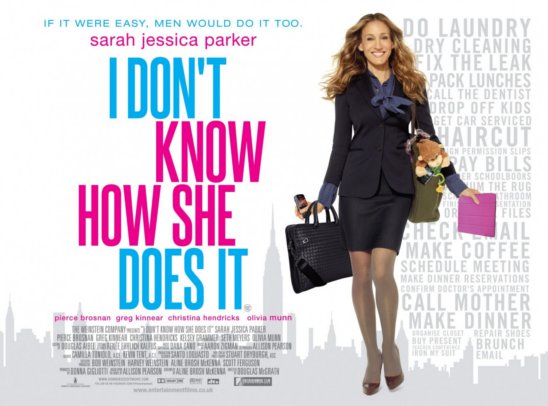 |
|
|
| I Don’t Know How She Does It, starring Sarah Jessica Parker |
|
|
|
I have no doubt that the recently released romantic comedy
I Don’t Know How She Does It, starring Sarah Jessica Parker, reeks of the same sexist and misogynistic tropes that exist in most romantic comedies. However, the film probably at least
attempts to make a complicated argument regarding how women with high-powered careers and a family struggle to balance both of them, especially in a society that still doesn’t offer pay equity, doesn’t insist on equal sharing of responsibilities in the domestic sphere (as evidenced by every study ever), and doesn’t fully embrace nontraditional roles in child-rearing (e.g. stay-at-home dads). Some reviewers even argue that this particular kind of film doesn’t
matter anymore; we’re so far
past this; it’s such an
80s issue. Because we’re so
postfeminist, right? Um, wrong. The fact is, women in the workforce still, in 2011, contend with these issues. We’re asked to sacrifice our family for our career … or our career for our family … in a way that men have never been asked to do or, more importantly perhaps, have never been labeled Worst Father Ever for
doing so.
I haven’t seen the film, so I can’t comment on how successfully or unsuccessfully it tackles these issues, or whether it ultimately validates the dominant ideology that women shouldn’t sacrifice family for career, or whether it works to move past its showcasing of upper-class privilege in an economic climate that certainly makes the career/family balancing act an important issue for all women. Unfortunately, I can, however, comment on how successfully or unsuccessfully film reviewers have discussed the film. Just reading the brief snippets of reviews on Rotten Tomatoes pissed me off. (You’ve been warned.) But two reviews in particular—Stephen Holden’s in the New York Times and David Cox’s in the Guardian—sent me over the fucking edge.
Holden begins his review by talking about Sarah Jessica Parker’s plague of “post-Carrie Parkeritis” and describes it as a curse “in which a star finds herself condemned to eke out the last drops of freshness from the role … that made her world famous eons ago.” He then goes on to compare Sarah Jessica Parker’s Sex and the City problem with Julia Roberts’ Pretty Woman problem, which he dubs “The Roberts Syndrome.” This is seriously problematic. Julia Roberts, since her role in Pretty Woman twenty years ago, has won an Oscar, has been nominated for several Oscars, has won several Golden Globes, has been nominated for two Critics’ Choice Awards (and won the Best Actress category), has been nominated for an Emmy and an Independent Spirit Award, has won about a million People’s Choice Awards, and is generally considered one of the most popular and talented actresses on the planet.
You don’t get to compare Julia Roberts’ entire career to Sarah Jessica Parker’s entire career just because they’re both women who became famous for playing a character the audience connected with. If we’re being honest about identifying a problem “in which a star [is] condemned to eke out the last drops of freshness from the role … [made] famous eons ago,” a more apt comparison might involve, oh, say … any successful male action star who keeps making the same action movies over and over and over and will only, forever, in his entire career, continue to make the same incessant action movies. Comparing one famous film star who has a vagina with another famous film star who has a vagina doesn’t make the comparison fucking true.
But it gets worse. Holden employs the most sexist language I’ve ever read in a New York Times film review. I’ll just pull some quotes, for starters, with the offending passages in bold:
“Although the movie is chock-full of smart one-liners, and Ms. Parker’s maniacally giddy Kate wages a full-scale charm offensive, the movie inadvertently makes Kate’s supposedly golden life look like a living hell.”
***
***
“But more often than not, Ms. Parker’s straining to be funny comes across as desperation to please.”
***
“Mr. Kinnear’s Richard is a near-cipher who reacts to Kate’s hysteria with mild exasperation, only raising his voice once (and not very loud).”
***
“A calm, enlightened, impossibly courtly, unattached widower who tolerates Kate’s every quirk and begins to fall in love with her, he is the polar opposite of a driven financial kingpin like Richard Fuld, the final former chief executive of Lehman Brothers.”
***
“The movie’s one unalloyed delight is Olivia Munn’s portrayal of Kate’s poker-faced assistant, Momo, a spiritual first cousin of Anna Kendrick’s Natalie Keener in “Up in the Air,” but icier and more robotic. Beneath Momo’s composure lurks a terror that leaks out when she learns she is pregnant.”
***
“Carrie Bradshaw flirted her way into mass consciousness in the late ’90s, when Ms. Parker was in her early 30s, and well before Sept. 11, two wars and a major recession dampened American exuberance. If Kate’s hyperkinetic cheer and shrill self-absorption are Carrie trademarks, 13 years after “Sex and the City” first appeared on television, their appeal has all but evaporated.”
Maniacally giddy. Full-scale charm offensive. Frazzled state. Desperation to please. Kate’s hysteria. Kate’s every quirk. A terror that leaks out when she learns she is pregnant. Icier and more robotic. Flirted her way into mass consciousness. Hyperkinetic cheer and shrill self-absorption. Straining to be funny. (Nice channeling of the douchebag
Hitchens here.) Holden’s review employs sexist language—words and phrases traditionally used to define and identify the behavior of women—and unapologetically does so. Hysteria? Quirky? Frazzled? Shrill? No. Some people will inevitably argue (or silently think) that this isn’t a big deal. Make no mistake—these supposed “little” issues provide a fucking breeding ground for the “bigger,” more important issues women face daily.
That’s just how it works.
It’s no secret that I lost a significant amount of respect for the New York Times when its botched coverage of a sexual assault did nothing more than condone rape and rape culture. In this case, Holden’s review perpetuates sexism and sexist attitudes in a much more subtle but no less significant way. I expect more than this from a supposedly progressive media organization such as the New York Times. (Sort of.) I also expect more from the fucking Guardian. What the hell, David Cox? If Holden’s sexism was subtle … Cox’s sexism is a full-frontal attack on women in the workforce:
“The family and the job keep making annoying demands, all of which she pluckily tries to meet.”
***
“He’s [Kate’s husband] trying to pursue a career of his own, but when junior falls down the stairs it’s Dad who has to take him to hospital, since Mom’s away on business yet again.”
***
“Hubby comes to appreciate that he’s got to do more of the housework. This surely is the way things ought to be …
It’s not only Kate who thinks so. Highly advantaged women often seem to assume they’re entitled to total fulfilment both at work and at home … If they don’t get it, they’ve been robbed.”
***
“Ambitious mums can try to turn their partners into house-husbands, but it would be only fair to tell them what they’re in for. Instead of expecting childless colleagues to cover for them, they could admit that mumps and nativity plays will come first, and accept the consequences, however unwelcome.”
***
“It’s like this, Kate. If you want to have it all, it’s your job to work out how to do it. If you can’t, give something up. But don’t expect the rest of us to underwrite your bliss.”
Wow. Instead of analyzing this completely misogynistic, mean-spirited, and resentment-filled mess of a film “review,” I’ll do something that will blow your fucking mind. Pretend you’re browsing the internet. You’re interested in a new film that’s come out about how difficult it is for men to juggle both their families and their careers. (Don’t laugh.) You stumble upon a review in the Guardian. It looks something like this:
“The family and the job keep making annoying demands, all of which he pluckily tries to meet.”
***
“She’s [his wife] trying to pursue a career of her own, but when junior falls down the stairs it’s Mom who has to take him to hospital, since Dad’s away on business yet again.”
***
“Wifey comes to appreciate that she’s got to do more of the housework. This surely is the way things ought to be …
It’s not only her husband who thinks so. Highly advantaged men often seem to assume they’re entitled to total fulfilment both at work and at home … If they don’t get it, they’ve been robbed.”
***
“Ambitious dads can try to turn their partners into house-wives, but it would be only fair to tell them what they’re in for. Instead of expecting childless colleagues to cover for them, they could admit that mumps and nativity plays will come first, and accept the consequences, however unwelcome.”
***
“It’s like this, Man. If you want to have it all, it’s your job to work out how to do it. If you can’t, give something up. But don’t expect the rest of us to underwrite your bliss.”
This version of the “review” is funny, ridiculous, difficult to follow (not to mention imagine), and sad. It illustrates the fact that men don’t have to “assume they’re entitled to total fulfillment both at work and at home” because our society
says they’re entitled to it. Ambitious dads don’t have to “try to turn their partners into house-[wives]” because our society still says in 2011 that it’s preferable for women—not men—to stay home with the children. Men in the workforce aren’t “expecting childless colleagues to cover for them” because our society doesn’t expect men to carry the brunt of childcare responsibilities—that’s still women’s work. If men “want to have it all” it’s not “[their] job to work out how to do it” because our society has already worked out how to do it, often at the expense of women’s happiness and individual autonomy. (Side note: I find it nothing less than cruel and unusual that these expectations of women still exist, yet access to birth control, reproductive healthcare, and abortion is becoming increasingly elusive.)
The language of these two film reviews says much more about the reviewers and their misogyny—regardless of whether they intended to come across as sexist—than it does about the actual film. I find it troubling that a movie attempting to explore an issue that women still struggle with (even if it ends up reinforcing rather than critiquing the problem) gets so much coverage, not of the success or failure of its subject matter, but of the pluckiness, giddiness, flirtatiousness, hysteria, and general over-reaching of its main woman character. As if that weren’t enough, and we needed a healthy dose of objectification thrown in for good measure, the free newspaper Metro made sure they had it covered.
Thanks Holden, Cox, and Metro! Truly great work here indeed.




